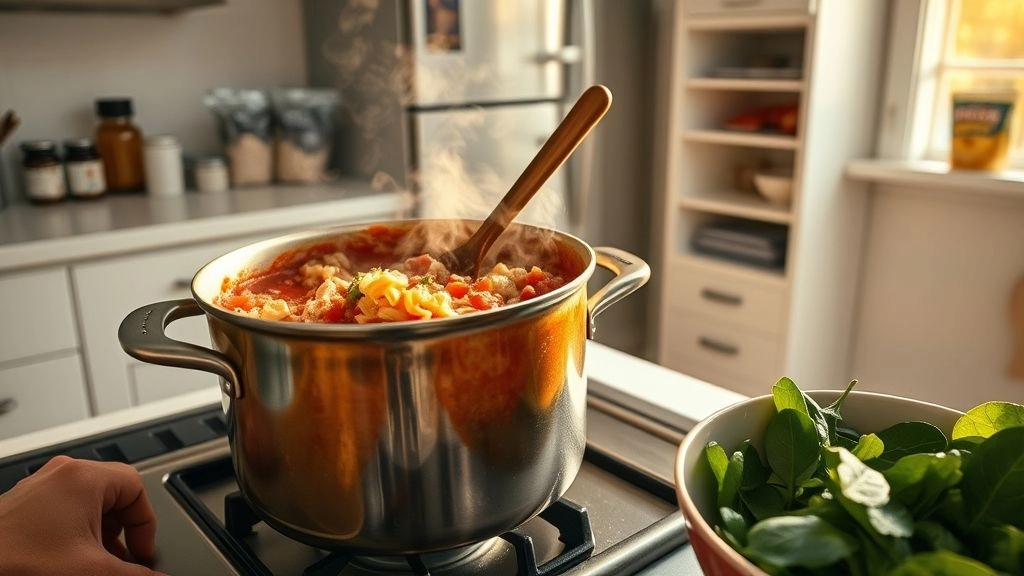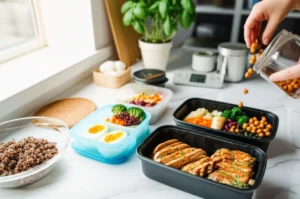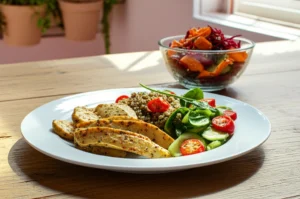Surprise Costs Lurking
You ever hit that moment standing in the kitchen, fridge door wide open, and think… should I just order something? Because—ahem—last week, that definitely happened to me. Long day, zero motivation. I thought, what’s one little takeout order?
But then, the credit card bill hit. Ugh. Seven “quick” takeout meals… $91.23 gone. For one tired person. Have you ever noticed how fast those small dinners out stack up? It’s almost sneaky. In the thick of it, it’s easy to believe eating out is equal (or cheaper!) to home cooking, but… is it?
Let’s get real about what you’re actually spending, plus some tricks to stop that money-leak (no guilt trips, promise). We’ll drop in stories, nitty-gritty numbers, and ways to make home cooking for one less… sad salad, more “I’ve got this.” Buckle up.
Why Takeout Sneaks Up
How A Quick Meal Becomes Pricey
Ever started with just “a burger” and ended with fries, a drink, maybe a cookie? (No shame, that’s my order too.) Suddenly, that $6 meal is $13. Little add-ons, delivery fees, and tips pile up. Every. Single. Time.
Table: Eat Out vs. Home Burger
| Item | Eat Out | Cook at Home |
|---|---|---|
| Burger + Fries + Soda | $12.50 | $3.85 |
| Extra (tip, delivery, app fee) | $2.75 | $0 |
| Total Per Meal | $15.25 | $3.85 |
Even when you skip delivery, you’re looking at at least $10-$15 per meal for basic eating out. And if you ever scroll through Eating out vs cooking at home Statistics, it’s wild—studies say home meals can cost as little as $4.25, while even a so-called cheap restaurant meal is $16+. That’s almost four times more. Cooking at home isn’t just cheaper in theory; it’s cheaper in real dollars, meal after meal according to research on spending habits.
Solo Cooking: Is It Worth It?
Alright, so the price per meal is lower… but is it actually easier for a single person to save? Or are we just buying kale and throwing it out in a week?
When you’re shopping for one, there’s risk—buy too much, let it spoil, and suddenly those grocery savings melt away. (Just me, or has anyone else found a science experiment in the veggie drawer? Gross.) But… with a little prep, the scales tip hard toward cooking.
A Personal Win: Batch Spaghetti
After blowing too much cash on “just for me” takeout, I decided to see how far $20 of groceries could go. Ground turkey, dried pasta, canned tomatoes, some spices. Made a massive pot of sauce, portioned it out, and the freezer became my best friend. I ate real food for five nights. Total cost per serving? Less than four bucks. No wilted lettuce or guilt.
This isn’t rare. People who meal plan, shop smart, and freeze leftovers consistently beat those restaurant prices—even for complicated dishes why cooking at home is cheaper essay fans will tell you: buying in bulk and taking advantage of sales, it works even better for us solo types.
What Do the Stats Say?
Is It Really That Much Cheaper?
Short answer: Yes, usually. But there are weird outliers in the data. I found a viral study that claimed eating out (at a chain steakhouse, no less) was $2 to $3 cheaper than making the same meal at home. My first reaction? Seriously? Turns out, those numbers fudge things—like assuming you throw away every leftover ingredient at home, or buying groceries one meal at a time. Not realistic according to a quirky article investigating the claim.
Leftovers Change Everything
Take salad, for example. If you buy lettuce for one meal, sure, it costs more up front. But you’ve got enough for four or five more servings. Soup? Make a big pot—that’s lunch all week. So, even if your first “home steak night” comes close to restaurant prices, the leftovers pull your average cost way, way down.
Does Location Change the Math?
It can! In cities like Singapore or certain big metros, street food is so cheap and quick that it competes with what you’d spend on groceries, especially if you hate cooking or have zero kitchen gear. But if you’re in most U.S. towns? Not even close. Home cooking wins, especially over time. For New Yorkers, cooking at home can save up to $19 a meal compared to eating out. (That almost makes city rent feel less brutal… almost.) Eating out vs cooking at home Statistics back it up.
Cooking at Home: Tiny Tweaks, Big Wins
Saving Without the Headache
I’m not here to guilt you out of your favorite tacos, but let’s be honest: home cooking doesn’t have to mean spending hours in the kitchen. One of my favorite hacks? Rotating three crowd-pleaser meals. Things like taco bowls, stir-fry, breakfast-for-dinner. Grocery list is simple, time investment is minimal, and… leftovers actually taste good.
No-Fuss Recipe Ideas
- $3 chili: one can beans, one can diced tomatoes, handful of frozen veggies, some spice. Done in 15 minutes, makes two meals.
- Egg fried rice: Scramble leftover rice with an egg, frozen peas, and a splash of soy sauce. Dinner in a single pan, two bucks a serving.
- Mug omelet: Eggs, spinach, cheese, microwave. You don’t even need to do dishes. (Don’t judge…)
You see? Cooking at home isn’t about perfection—it’s about making cheap stuff tasty and quick.
A Hidden Perk: Health on a Budget
There’s a sneaky benefit to home cooking… your health. You know every ingredient that goes in. No surprise oils, no sugar overload (unless you want it—your kitchen, your rules). Studies have shown frequent home-cookers have a higher “Healthy Eating Index” and even spend less overall. Want the receipts? Check Is cooking at home healthier—you’ll feel better just reading what’s possible.
Basically, it’s not just a wallet win. When you prep your own food, you control the quality, the portions, and your future you (with lower medical bills) will be fist-bumping current you for making the switch.
Quick Comparison: Pros and Cons
So… Why Does Anyone Eat Out?
Look, sometimes you want someone else to cook and clean. No shame in that. Eating out can be fun, convenient, and, for sure, a solid treat when life gets nutty. The research even says the line between eating out and cooking at home might be blurring a tiny bit—especially when grocery prices spike according to some consumer reporting.
But, when it comes to cold, hard cash? It’s almost always cheaper to stick with your own kitchen for regular meals. Especially when you use leftovers well and shop with a plan.
Table: Quick Look – Pros & Cons
| Eating Out | Cooking at Home | |
|---|---|---|
| Cost | High (esp. with tip/fees) | Low if you plan ahead |
| Convenience | Big win, no cleanup | More effort |
| Health/nutrition | Hard to track | You control everything |
| Leftovers | Rarely | Almost every meal |
Want the full scoop? Read up on Eating out vs eating at home pros and cons for more deep-dive comparisons—I’m rooting for your wallet (and your taste buds) here.
Track Your Real Costs
Try This for a Week
Here’s a challenge: track every penny spent on food for just seven days. Eating out, groceries, impulse snacks. Don’t overthink it. At the end? Do a little math—what’s your true “cost per meal” for home vs. out?
I did this last summer and, full disclosure… was gobsmacked. The “small” restaurant meals came out double my home-cooked snacks, even when I splurged on avocados. It wasn’t even close. Expenses add up in places you aren’t watching—like $3 coffees, random bakery runs, or sushi on a whim.
Tools and Tricks
There are free apps for this (even a notes app works). If you want to geek out, pair it with insights from why cooking at home is cheaper essay for ways to stretch simple grocery trips into a week of meals (turn that rotisserie chicken into tacos, noodle bowls, and sandwiches—trust me, you won’t get bored).
Long-Game Wins (It’s Not Just Food)
Let’s zoom out a second. This isn’t just about saving on Tuesday night’s dinner. Every $5 or $7 you don’t spend on takeout? That’s going toward an emergency fund. A weekend trip you thought you “couldn’t afford.” Less hustle, less stress. A year of mostly home-cooked meals can add up to literally thousands of dollars in your pocket, just for tweaking a few routines.
Conclusion: Your Choice, Your Wallet, Your Wins
If you’ve ever asked, “Is it cheaper to eat out or cook for one person?” let this be your nudge—your kitchen, even that tiny rental one, is basically a money-printing machine. Home-cooked meals almost always cost less, give you more control, and let you eat like royalty on a budget. Is it some effort? Sure. But it’s doable—for real people, with real schedules, and real cravings. Next time you’re eyeing your favorite sushi spot, ask yourself: am I hungry for food, or just for convenience?
Start small—one or two home-cooked meals a week. Try a new recipe. Track those receipts (you might just surprise yourself). Check links like Eating out vs cooking at home Statistics and Is cooking at home healthier for a deeper dive. And hey—if you mess up, order that burger, and try again tomorrow. Money saved is money earned, no judgment here. What do you think—is it time to give your stove a second chance?












